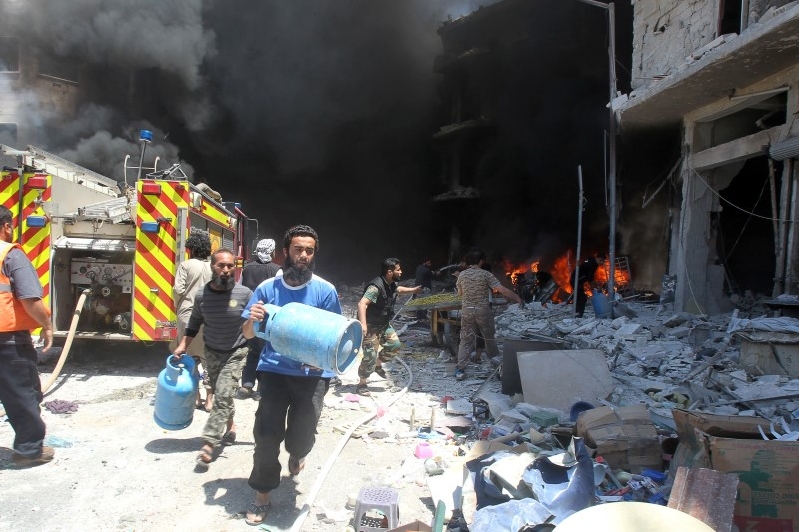
The Syrian regime bombarded the besieged city of Daraya with barrel bombs on Friday, mere hours after humanitarian groups dropped food aid on the isolated region for the first time in nearly four years.
CNN quotes the London-based Syrian Observatory for Human Rights as stating that at least 68 barrel bombs were dropped on Daraya, located just southwest of the Syrian capital.
Ahmad, an activist living in Daraya, told the outlet no casualties had been reported but some of their last-remaining agricultural crops had been hit, further devastating the city.
The attack came shortly after agencies delivered rice, lentils, sugar, oil and wheat flour to civilians for the first time since the government laid siege to the town in late 2012. The convoy reportedly contained food baskets for 2,400 people, or a third of its some 6,000 residents.
Council spokesman Hossam Ayyash said it was unclear how the aid would be distributed, as the supplies brought will last under two weeks.
"Of course we are grateful to the team that brought in the supplies, but unfortunately they are not sufficient. We don't know what decision will be taken (on how to distribute the aid), but it won't be able to be shared out among everyone who's here," Ayyash said.
One resident, who did not wish to be named, told the Telegraph she was grateful to see flour and lentils for the first time in nearly a year, but added: "We are obviously so glad to see food, but we are having to share it out among us and worried it won't last into next month."
Daraya has been subject to some of the worst bombardment during the country's six-year civil war since it became of the first to protest against President Bashar al-Assad's rule.
The UN estimates that there are currently 592,700 people living under siege in Syria, with the vast majority of them - some 452,700 people - besieged by government forces. Hundreds are believed to have died from starvation.
The New York Times notes that Assad has not stopped attacks on rebel-held areas, creating security risks for aid providers. The president is also unwilling to negotiate an end to the war: last week, he vowed to recapture "every inch" of Syria lost to his enemies over the past five years.
Following the attacks, Assad's government drew criticism from around the world.
"Obviously, such attacks are unacceptable in any circumstance; but in this case, they also hamper the delivery and distribution of badly needed assistance," U.S. State Department deputy spokesperson Mark Toner said in a press briefing Friday.
"It shouldn't be a situation where the Syrian government, for example, decides which areas receive humanitarian assistance," he added.
UK International Development Secretary Justine Greening welcomed the "arrival of desperately needed food supplies, delivered by UK-funded agencies" and she said Assad must "make good on his promise to let aid flow."
"At the same time, punishing areas where access has been agreed - whether attacks on children's hospitals in Aleppo or renewed barrel bombing on Daraya -- is utterly despicable and a violation of international humanitarian law," she said.






